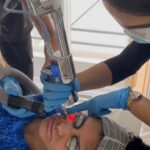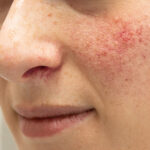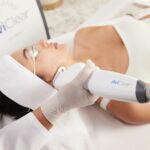
Acne during pregnancy is surprisingly common and for many tends to occur during the first (and possibly second) trimester. Surges of the hormone progesterone can lead to increased oil production, driving spots.
Dermatologists have noted that pregnant women with acne may be more self-conscious of the change in appearance pregnancy can bring.
You must not use treatments such as retinoids (oral or topical), spironolactone, and certain antibiotics during pregnancy due to a link with birth defects. It is trickier to state what is safe to use, given that researchers don’t carry out studies on pregnant women. Much of our data therefore comes from animal studies.
Most acne treatments during pregnancy should be thought of as “holding measures”. In an ideal world, if you suffer with troublesome acne it should be treated before conception or pregnancy is on your radar. Of course, this may not always be possible!
So what treatments are considered “safe”?
- Over-the-counter face washes containing salicylic acid are considered safe at concentrations of no more than 2% for limited periods of time. It can be a risk when used in higher concentrations such as in chemical peels. Oral salicylic acid is not safe. Before using salicylic acid, it is best to discuss with your GP or a dermatologist.
- Over-the-counter alpha-hydroxy acids (AHAs) such as glycolic and lactic acid are generally considered safe to use in skincare products. High concentrations such as those found in chemical peels should be avoided.
- Topical azelaic acid is a good option in pregnancy for its anti-inflammatory effects as well as its ability to reduce pigmentation (often also associated with pregnancy). It can be obtained over-the-counter in strengths of 10% or on prescription – Finacea (15%) and Skinoren (20%).
- Topical benzoyl peroxide in concentrations of up to 5% in limited amounts is considered safe as significant absorption through the skin to the foetus is unlikely.
- Certain oral antibiotics (erythromycin) can be prescribed by your GP or dermatologist.
- Certain laser- and light-based therapies can be helpful at reducing inflammation. Red and blue LED treatment is considered safe but need to be carried out at regular intervals (weekly!) for maximum benefit. This can be expensive and time-consuming.
If you are struggling with pregnancy acne then it is important to seek advice from your GP or dermatologist. This advice is generic and can’t be specifically tailored to the individual without clinical assessment and review.
Acne should not be dismissed due to pregnancy and it is a personal decision whether or not you choose to have treatment during this time. The scientific data isn’t clear-cut due to a lack of trials in this area and a risk/benefit approach needs to be taken. The safest approach is a frank discussion with your doctor who will be able to guide you.





